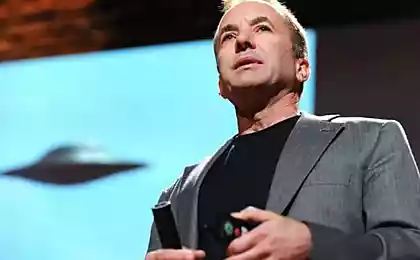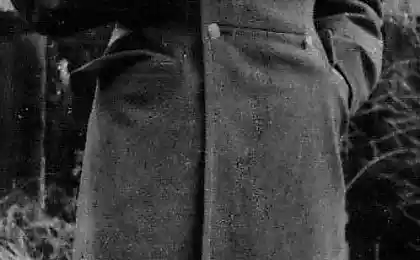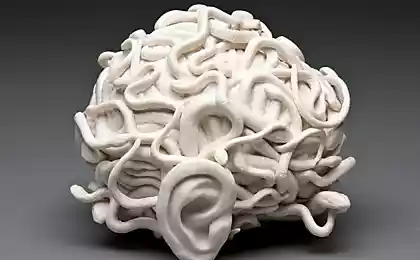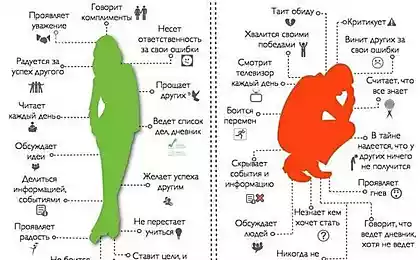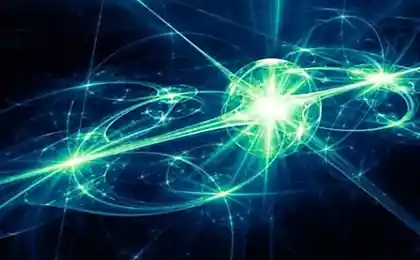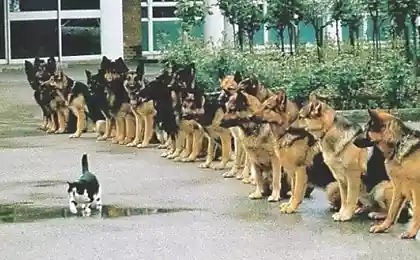541
How the brain motivates us to act
Judging by the queries in search engines, many people want to know where they are "centers of motivation". However, unfortunately, such centres on the map of the hemispheres of the brain: to create and encourage the processing of pulses involves multiple sites of nervous tissue, and they are all simultaneously engaged in other processes.
Like all processes in the brain, motivation is a complex business. It is based on the action of neurotransmitters — bioactive chemicals that transmit electrical impulse from neuron to neuron and from neuron to muscle tissue. In the case of motivation, the neurotransmitters affect the brain in arousing the action, forcing him to create a desire, to assess the compensation, to focus attention, to refer to skills or memory and perform other actions necessary to ensure that seconds later will become the thing to do.
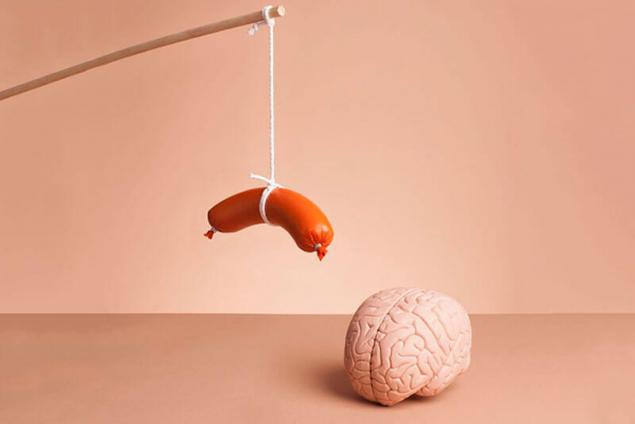
© Wendy van Santen
In the role of the protagonist here is dopamine, known to many as the "pleasure hormone". For the brain is an important substance: it is produced in his tissues in a variety of cases and is involved in different processes, causing a feeling of recovery and the joy of receiving the award, elation and mood improvement. It is curious, however, that when a person is on the way to the goal, dopamine performs its task before it is achieved. He rewards us before we come to the sought, makes the journey pleasant, it pushes the mind forward, prompting to achieve the desired or avoid the threat. The result is something we are all familiar: the prospect of battle with the circumstances of the titillating promise of a reward encourages baby steps on the way to encourage it, and we, in addition to the pressure of responsibility, experience many pleasant and exciting feelings.
But how and where is dopamine? It all starts in the limbic system, a collection of different brain structures located under the cortex, in the depth of the skull, and is responsible for the basic patterns of behavior, favorable from the point of view of evolution, involved in the formation of emotions and other functions. If you go through the dark Park, and the sound of footsteps behind other passer-by is causing your fear and desire to escape, is the limbic system warns you about possible dangers. If you hear an unfamiliar cry baby and can not pay attention to him, it's her again: offers to protect helpless calves. If you see on display in a cafe donut and want to eat it, it is also her job — advice to eat nutritious food whenever it is available.
The limbic system there is even an alligator. From the point of view of evolution it is considered one of the most ancient elements of the brain, and in the development of a human embryo is laid down before the cortex (but later than the trunk, which connects the brain with the spinal cord and is responsible for reflexes). "Attack", "run", "eat", "make a seed", "protect the kids" — all this signals the limbic system. She is actively involved in shaping the emotional response to external and internal circumstances, as well as the effects that emotions have on the body (e.g., anger quickens the pulse, and from shame the blood rushes to the face). Some scientists call the limbic system dofaminovmi. Because it is based on the action of dopamine, which gives the brain an instant reward and thus induces us to favorable for survival of the species behavior.
But the man would not be man if he could not boast of not only a functional limbic system, but also a well-developed cerebral cortex, which distinguishes us so much from all other living creatures on the planet. The cortex of the human brain, among other things, able to handle abstract concepts and goals and to assess the abstract rewards, including, in the long term. This fact, apparently, in part, lies in the basis of motivational processes.
"Sometimes what brings us satisfaction, it is necessary for survival, says Samuel McClure, head of the Laboratory of neurobiology of decision-making at Stanford University. But a large prefrontal cortex is one of the characteristics of our species, and its ability to handle abstract concepts and goals are unique. We can use these areas in order to overcome the effects of the automatic operation of the limbic system and motivate yourself for the different behaviors. Surprisingly, each person may behave according to abstract ideals, and not, as required by the instant rewards system".
Today neuroscientists believe that all the strategies of human behavior is automatic. They are based on the desire to survive inherent in us, as representatives of any other species on the planet, evolutionary. The impulse of hunger, aggression, escape, the desire to reproduce or the protection of offspring born in tissues of the limbic system and is pushing us to a simple strategy of decision-making. However, the brain is designed so that to implement the "in thing" this impulse must pass through the prefrontal cortex, is able to create abstract goals and behavior based on them. She estimates received from the limbic system proposal and decides whether or not to use it.
The dialog looks like this:
Limbic system: "Eat a doughnut!"
Prefrontal cortex: the "It calorie".
HP: "Exactly! Come on, eat!"
P. K.: "But I'm on a diet".
HP: "It's delicious!"
P. K.: "No, I have a month from the award ceremony "Oscar". Imagine how I'll look in his new tuxedo, if you will lose weight!"
HP: "Delicious doughnut!"
P. K. "to Stand on the red carpet and feel attractive will be much nicer than to eat a donut to break the diet. No."
And as a result the person eating a salad.
Researchers believe that the process of decision-making based on abstract goals and abstract benefits to the brain difficult. It takes more energy, requires more time. However, the motivation to continue the action, contrary to the recommendations of the limbic system, also supported by short bursts of dopamine. They occur when we reach intermediate goals: for example, "overcome by temptation" or "lost another kilo".
These bursts act as an advance and promise a great sense of achievement big abstract goals, goals with a capital letter (and an enormous amount of dopamine that accompanies this event). It can match with short-term pleasure of eating a donut, so that the brain, in fact, treat the man honestly and simply invites him to choose the "more fun".
"Motivation depends on the bark, because the bark provides us with a goal, says McClure. But what makes her choose one target among many others? It is a question of activities dofaminovmi reward system within the limbic system, or rather of the nucleus accumbens (aka pleasure center deep in the brain. — Approx. ed.).
At the same time, we can use the prefrontal cortex to reflect on possible scenarios of development of events and illustrate them with examples. So you form an expectation of what reward you will receive, and thereby create purpose in the future. So as the process of motivation is based on the limbic system and in mesocortical path (one of the dopamine nerve pathways. — Approx. ed.). Imagining the possible scenario, you use this way to determine the size of the "dividends" you receive in the future from an emotional point of view."
But how the brain selects an abstract goal that we can strive for it? Today the answer to this question exists, however, neuroscientists believe that the basis of selection is the assessment of potential rewards. Perhaps our minds every time assess their capabilities and individual needs, and then chooses the pleasant, and perhaps the most elusive: the more small steps you will have to do on the way to the goal, the more dopamine the brain receives. And even more: the more work will be invested in the implementation of the task, the stronger will be emotional, and probably dopamine response in the final.
Operates this process "evolutionary" aspirations: to be fed, to find a suitable partner, to defeat the enemy? Probably, Yes. Steve jobs advised "stay hungry", Sigmund Freud argued that creativity is the sublimation of libido, the various monastic orders recommended penance to maintain a spiritual fire, in the environment of medieval chivalry were adopted restrictive vows, which was not removed until the character has achieved the task.
In culture you can find countless examples where restraint was used to achieve abstract goals. Clearly, based on this intuitive strategy is intuitive-use generated by the limbic system of desires as "fuel". Perhaps his presence allows you to launch dopamine "mechanics", and, as a result, motivates us to move forward.
P. S. And remember, just changing your mind — together we change the world! © Join us at Facebook , Vkontakte, Odnoklassniki
Source: theoryandpractice.ru
Like all processes in the brain, motivation is a complex business. It is based on the action of neurotransmitters — bioactive chemicals that transmit electrical impulse from neuron to neuron and from neuron to muscle tissue. In the case of motivation, the neurotransmitters affect the brain in arousing the action, forcing him to create a desire, to assess the compensation, to focus attention, to refer to skills or memory and perform other actions necessary to ensure that seconds later will become the thing to do.

© Wendy van Santen
In the role of the protagonist here is dopamine, known to many as the "pleasure hormone". For the brain is an important substance: it is produced in his tissues in a variety of cases and is involved in different processes, causing a feeling of recovery and the joy of receiving the award, elation and mood improvement. It is curious, however, that when a person is on the way to the goal, dopamine performs its task before it is achieved. He rewards us before we come to the sought, makes the journey pleasant, it pushes the mind forward, prompting to achieve the desired or avoid the threat. The result is something we are all familiar: the prospect of battle with the circumstances of the titillating promise of a reward encourages baby steps on the way to encourage it, and we, in addition to the pressure of responsibility, experience many pleasant and exciting feelings.
But how and where is dopamine? It all starts in the limbic system, a collection of different brain structures located under the cortex, in the depth of the skull, and is responsible for the basic patterns of behavior, favorable from the point of view of evolution, involved in the formation of emotions and other functions. If you go through the dark Park, and the sound of footsteps behind other passer-by is causing your fear and desire to escape, is the limbic system warns you about possible dangers. If you hear an unfamiliar cry baby and can not pay attention to him, it's her again: offers to protect helpless calves. If you see on display in a cafe donut and want to eat it, it is also her job — advice to eat nutritious food whenever it is available.
The limbic system there is even an alligator. From the point of view of evolution it is considered one of the most ancient elements of the brain, and in the development of a human embryo is laid down before the cortex (but later than the trunk, which connects the brain with the spinal cord and is responsible for reflexes). "Attack", "run", "eat", "make a seed", "protect the kids" — all this signals the limbic system. She is actively involved in shaping the emotional response to external and internal circumstances, as well as the effects that emotions have on the body (e.g., anger quickens the pulse, and from shame the blood rushes to the face). Some scientists call the limbic system dofaminovmi. Because it is based on the action of dopamine, which gives the brain an instant reward and thus induces us to favorable for survival of the species behavior.
But the man would not be man if he could not boast of not only a functional limbic system, but also a well-developed cerebral cortex, which distinguishes us so much from all other living creatures on the planet. The cortex of the human brain, among other things, able to handle abstract concepts and goals and to assess the abstract rewards, including, in the long term. This fact, apparently, in part, lies in the basis of motivational processes.
"Sometimes what brings us satisfaction, it is necessary for survival, says Samuel McClure, head of the Laboratory of neurobiology of decision-making at Stanford University. But a large prefrontal cortex is one of the characteristics of our species, and its ability to handle abstract concepts and goals are unique. We can use these areas in order to overcome the effects of the automatic operation of the limbic system and motivate yourself for the different behaviors. Surprisingly, each person may behave according to abstract ideals, and not, as required by the instant rewards system".
Today neuroscientists believe that all the strategies of human behavior is automatic. They are based on the desire to survive inherent in us, as representatives of any other species on the planet, evolutionary. The impulse of hunger, aggression, escape, the desire to reproduce or the protection of offspring born in tissues of the limbic system and is pushing us to a simple strategy of decision-making. However, the brain is designed so that to implement the "in thing" this impulse must pass through the prefrontal cortex, is able to create abstract goals and behavior based on them. She estimates received from the limbic system proposal and decides whether or not to use it.
The dialog looks like this:
Limbic system: "Eat a doughnut!"
Prefrontal cortex: the "It calorie".
HP: "Exactly! Come on, eat!"
P. K.: "But I'm on a diet".
HP: "It's delicious!"
P. K.: "No, I have a month from the award ceremony "Oscar". Imagine how I'll look in his new tuxedo, if you will lose weight!"
HP: "Delicious doughnut!"
P. K. "to Stand on the red carpet and feel attractive will be much nicer than to eat a donut to break the diet. No."
And as a result the person eating a salad.
Researchers believe that the process of decision-making based on abstract goals and abstract benefits to the brain difficult. It takes more energy, requires more time. However, the motivation to continue the action, contrary to the recommendations of the limbic system, also supported by short bursts of dopamine. They occur when we reach intermediate goals: for example, "overcome by temptation" or "lost another kilo".
These bursts act as an advance and promise a great sense of achievement big abstract goals, goals with a capital letter (and an enormous amount of dopamine that accompanies this event). It can match with short-term pleasure of eating a donut, so that the brain, in fact, treat the man honestly and simply invites him to choose the "more fun".
"Motivation depends on the bark, because the bark provides us with a goal, says McClure. But what makes her choose one target among many others? It is a question of activities dofaminovmi reward system within the limbic system, or rather of the nucleus accumbens (aka pleasure center deep in the brain. — Approx. ed.).
At the same time, we can use the prefrontal cortex to reflect on possible scenarios of development of events and illustrate them with examples. So you form an expectation of what reward you will receive, and thereby create purpose in the future. So as the process of motivation is based on the limbic system and in mesocortical path (one of the dopamine nerve pathways. — Approx. ed.). Imagining the possible scenario, you use this way to determine the size of the "dividends" you receive in the future from an emotional point of view."
But how the brain selects an abstract goal that we can strive for it? Today the answer to this question exists, however, neuroscientists believe that the basis of selection is the assessment of potential rewards. Perhaps our minds every time assess their capabilities and individual needs, and then chooses the pleasant, and perhaps the most elusive: the more small steps you will have to do on the way to the goal, the more dopamine the brain receives. And even more: the more work will be invested in the implementation of the task, the stronger will be emotional, and probably dopamine response in the final.
Operates this process "evolutionary" aspirations: to be fed, to find a suitable partner, to defeat the enemy? Probably, Yes. Steve jobs advised "stay hungry", Sigmund Freud argued that creativity is the sublimation of libido, the various monastic orders recommended penance to maintain a spiritual fire, in the environment of medieval chivalry were adopted restrictive vows, which was not removed until the character has achieved the task.
In culture you can find countless examples where restraint was used to achieve abstract goals. Clearly, based on this intuitive strategy is intuitive-use generated by the limbic system of desires as "fuel". Perhaps his presence allows you to launch dopamine "mechanics", and, as a result, motivates us to move forward.
P. S. And remember, just changing your mind — together we change the world! © Join us at Facebook , Vkontakte, Odnoklassniki
Source: theoryandpractice.ru











